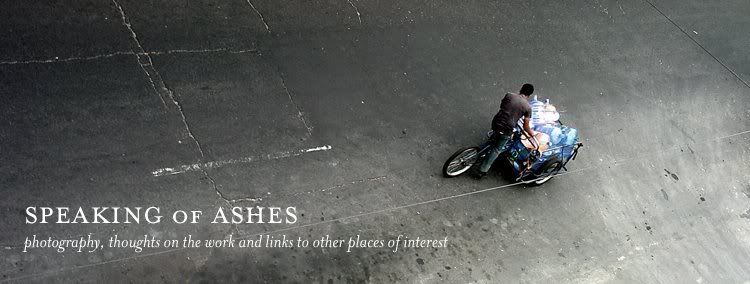community and mind
 Couple of really good themes coming up from the comments below:
Couple of really good themes coming up from the comments below:
springsandwells said... It's interesting that a few of the commenters seem so sure that they can get all the insight and inspriration on their own... and seem to feel that there is little or no value to be gained from a community. [s&w is talking about the commenters in the previously linked blog entry here.]I feel a little bad about singling out old Hyacinthe when far worse examples of spoken and written pretensia are abundant in the art-world, though happily they are not so much in the blogosphere. I get the feeling that a lot of art-bloggers are working on blogs as much in reaction against written pretensia as they are against the main-stream media.
Steven LaRose said... Ok, here is my question: Rejuvenating the human spirit is essential, but is that art? I'm asking myself this now. What is the difference between therapy and art? I feel like I know.
I also get the feeling that pretensia developed out of the lack of community, that springsandwells mentions and that I think the mainstream art shriekers insist is a pro-forma requirement for art atmosphere. Just as an example, you can't really imagine an MFA faculty that is united by a common philosophy of art-teaching or art-making, can you? How about a cooperative that is united in a single vision, and an under-riding platform ? I think this is why certain cooperatives of political artists and printmakers have a bit more success, at least at pulling off shows, even if everyone frequently knows what to expect from them, and knows more or less what they are going to look like.
The MFA faculty though, dis-united as it is and in lieu of a unified philosophy, defualts to a lot of assumptions that are at best badly expressed through pretensia, their lingua franca. I wrote a little about manifesto writing in reference to Mikhail Epstein's Towards the Techno-Humanities: A Manifesto, back in April when that article came out. As I quoted Epstein before, let me cut to the meatey part: "Manifestos are neither factual nor fictional--they are formative." Lacking a formative vision of what the hell they are doing, that is lacking any idea to actually make manifest, a whole lot of pretensia is necessary to shore it up. And lacking any critical apparatus to describe it, a whole lot more pretensia is assumed to prevent it from collapsing violently into a heap of nothing.
Taking up what Steven LaRose says above there are components of a philosophy of art-making and art-teaching that we can be explicit about, even if we can't necessarily spell-out a manifesto in it's entirety. One of these components is certainly that healthy psychologies produce healthy art and unhealthy psychologies affect the art (and everything else) that we perceive. An unhealthy psychology insists upon the conservative condemnation of community because individual artistry or expression is muddled in socialist idealism. This psychology is atomistic and refuses to acknowledge "mind" as part of the orchestration device we've inherited and that we use to organize that part of ourselves that is not confined within the hermetically (and deceptively) sealed part of us that the conservative considers "Mind."
All of that said, it is not the goal of art to "rejuvenate the human spirit," but to rejuvenate "mind," including environment, community, making things, womankind, psychological development, economic equality, whatever... Therapy is an atomistic attempt to modify "Mind." Art is just something that does what it is designed to do, and does it well. I think an open healthy participant in integrated mind will see that poor Hyacinth's family workshop awareness things are not that far off the mark. If we can just convince her not to borrow language from the Right maybe we can all go and experience ?


No comments:
Post a Comment